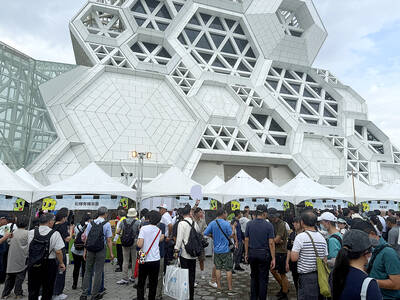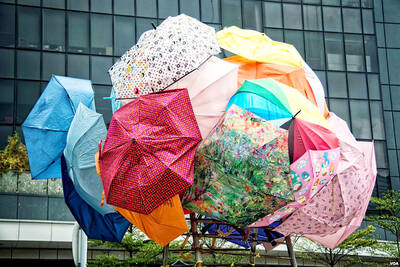Cursive III is modern dance at its best. It is also Lin Hwai-min's (林懷民) most impressive work in years. It is dance stripped down to the bare essentials.
Yes, the scrolls (six all told) were stunning and watching the flow of the ink as the scrolls were lowered and raised was interesting. But in the end, they were just just the backdrop, it was the dancers that riveted your attention.
The piece is organic, as cliched as that sounds. It's about nature -- the sounds of nature provide much of the score -- about meditation and letting go, about explosive bursts of energy and a more liquid flowing of energy.
The score begins with silence, and then ever so softly you hear the hum of the cicadas. It ends with cicadas before fading into silence. In between there is the rush of the wind, waves breaking on a pebbled beach, single drops of water and gentle rains, foghorns and temple bells -- and the percussive music made by a dancer's exhalations and foot slaps against the floor.
The are 12 movements in Cursive III. It begins with a furious burst of energy as 10 dancers leap and hurl themselves into the air. The piece then flows from solos to duets to ensemble sets.
In the last movement, the ensemble moves together almost as a single creature -- a sea anemone is what came to mind. The dancers are clustered together, feet and legs grounded to the floor, forming a single unit, while their arms and hands curve and float through the air just as an anemone's tentacles wave with the currents.
Then the group breaks up into individuals, who roll and slide across the stage until one by one they exit, leaving one dancer, curving, weaving, bending and flowing in silence -- and the final scroll comes down.
It is fitting the piece ends with Chou Chang-ning (周章佞) because she was outstanding, from her first solo at the beginning of the second movement, to her solo at the end.
Her sinuous grace makes even the most complicated maneuver look not just effortless but perfectly natural.
Wen Ching-ching's (溫璟靜) authority in her solo was remarkable while the stunning images created in the seventh movement linger in the mind: six women, silhouetted behind the scrolls, echoing the movements of Chiu I-wen (邱怡文).
"At the end of Cursive, I realized that it was just the beginning of a long journey," Lin said in an interview last week, speaking of the training in taichi and calligraphy Cloud Gate's dancers had begun to study.
It has been a journey worth the effort. Cursive III is a reminder that Cloud Gate is not just Taiwan's best known dance troupe, or the leading Asian modern dance company -- it is a paid-up member of the league of world-class companies, able to hold its own against the best that London, New York or Frankfurt have to offer.
Cloud Gate is performing a Cursive III at the National Theater through Sunday afternoon.
The company goes on the road on weekends next month in Taichung, Tainan and Kaohsiung and finishes up in Chiayi on Christmas Day.

Water management is one of the most powerful forces shaping modern Taiwan’s landscapes and politics. Many of Taiwan’s township and county boundaries are defined by watersheds. The current course of the mighty Jhuoshuei River (濁水溪) was largely established by Japanese embankment building during the 1918-1923 period. Taoyuan is dotted with ponds constructed by settlers from China during the Qing period. Countless local civic actions have been driven by opposition to water projects. Last week something like 2,600mm of rain fell on southern Taiwan in seven days, peaking at over 2,800mm in Duona (多納) in Kaohsiung’s Maolin District (茂林), according to

It’s Aug. 8, Father’s Day in Taiwan. I asked a Chinese chatbot a simple question: “How is Father’s Day celebrated in Taiwan and China?” The answer was as ideological as it was unexpected. The AI said Taiwan is “a region” (地區) and “a province of China” (中國的省份). It then adopted the collective pronoun “we” to praise the holiday in the voice of the “Chinese government,” saying Father’s Day aligns with “core socialist values” of the “Chinese nation.” The chatbot was DeepSeek, the fastest growing app ever to reach 100 million users (in seven days!) and one of the world’s most advanced and

The latest edition of the Japan-Taiwan Fruit Festival took place in Kaohsiung on July 26 and 27. During the weekend, the dockside in front of the iconic Music Center was full of food stalls, and a stage welcomed performers. After the French-themed festival earlier in the summer, this is another example of Kaohsiung’s efforts to make the city more international. The event was originally initiated by the Japan-Taiwan Exchange Association in 2022. The goal was “to commemorate [the association’s] 50th anniversary and further strengthen the longstanding friendship between Japan and Taiwan,” says Kaohsiung Director-General of International Affairs Chang Yen-ching (張硯卿). “The first two editions

It was Christmas Eve 2024 and 19-year-old Chloe Cheung was lying in bed at home in Leeds when she found out the Chinese authorities had put a bounty on her head. As she scrolled through Instagram looking at festive songs, a stream of messages from old school friends started coming into her phone. Look at the news, they told her. Media outlets across east Asia were reporting that Cheung, who had just finished her A-levels, had been declared a threat to national security by officials in Hong Kong. There was an offer of HK$1m (NT$3.81 million) to anyone who could assist